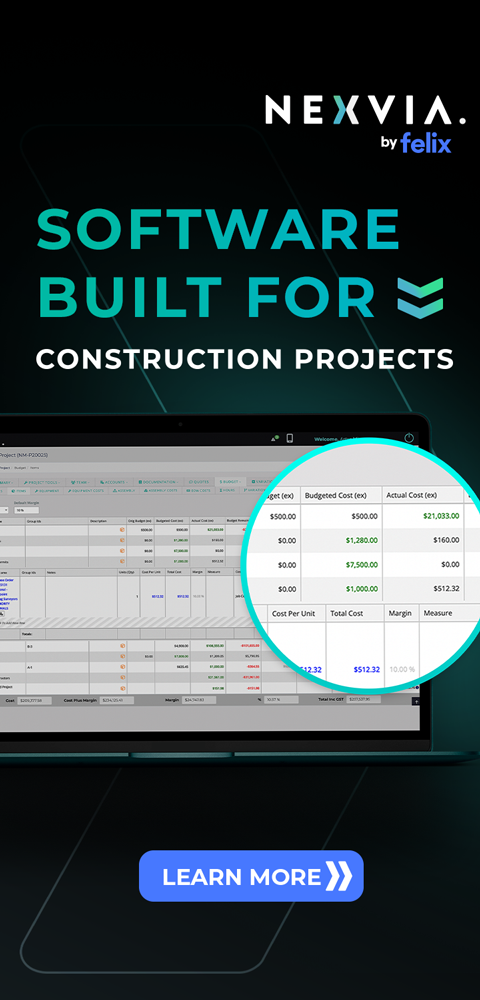Effective lead nurturing puts the ball squarely back in the prospect's court in the case that they would like to proceed. To save you time and anxiety, we've created 9 email templates to help you handle any quoting situation with efficiency.

With 10+ years under your belt, a comprehensive understanding of your team or machinery, and strong ideas about how to talk to contractors, it may seem like best practices don't apply to you. However, with new technology coming out every day, weekly changes in market prices, and shifting demands in contractor behaviour, one thing is abundantly clear: best practices are still an important part of business.
First of all, many people believe that the hire industry is old school. We list in the yellow pages, or rely on word of mouth, and wait for work to come to us. The approach that "this is how it's been done for decades" stops a lot of us from utilising call backs, emails, social media and other technologies to nurture leads into customers. That brings us to the question, are best practices effective?
I would answer that with a loud and resounding, "Yes!". Here are 8 reasons why a simple formula can help your business grow:
1. Grow your brand presence online
 To increase your chances of success this financial year, make sure you have a presence where potential customers are spending a lot of their time - online. 83% of Australian's use the internet, so if you don't have a strong presence online, you are not doing any favours for your business. While you may be generating new work from referrals, there's a whole nation out there regularly looking for plant, equipment and subcontractors to help with jobs of every size. After all, work is work, and every job you get will help your business grow that little bit more.
To increase your chances of success this financial year, make sure you have a presence where potential customers are spending a lot of their time - online. 83% of Australian's use the internet, so if you don't have a strong presence online, you are not doing any favours for your business. While you may be generating new work from referrals, there's a whole nation out there regularly looking for plant, equipment and subcontractors to help with jobs of every size. After all, work is work, and every job you get will help your business grow that little bit more.
Over 200,000 searches are made on Google each month for plant, equipment and subcontractor services, and listing in search terms means your business can connect with these industry-specific or machine-specific requests.
2. Respond to every lead
Respond to every plant, equipment or subcontracting service opportunity that comes through to you - regardless where it came from (direct call, website enquiry, PlantMiner enquiry). Each opportunity represents the chance to showcase your company, business capabilities, and track record to project decision makers. Not replying to a request is akin to expecting to win the lottery without buying a ticket.
Even if you're not sure of the fit
If you don't respond to opportunities, you are selling yourself short, and your business won't thrive to it's full potential. We've heard it before where suppliers don't respond to enquiries as they seem too small, or won't be 'worth their time'. This may be the case sometimes, but by acknowledging a service request, you are opening up opportunities to put your business forward for future work.
Even if you need to decline
Occasionally you’ll need to decline a project at your company, but how do you do this while keeping things friendly and not closing the door on future opportunities?
Make sure to send a brief follow up email along the lines of"Hi Joe, thanks for your inquiry about our excavator, This looks like a fantastic project but we aren't currently taking on new projects. We anticipate coming up for air around March and so if you’re still looking for that excavator then, we’d be happy to talk more about your requirements. Otherwise, we wish you luck in your search."
Never waste an opportunity to get on a contractors radar.
3. Respond in a timely manner
Seeing requests come in is always exciting for suppliers, but the time it takes you to respond to these prospects is crucial.Imagine you want to buy a new car. So you head to a car dealership, it’s a Saturday, and you’ve done all your research and you’re ready to buy. You tell the salesman you’re interested in a car, and the salesman says “Thank you for contacting me, I’ll be in touch in 24–48 hours,” and walks away. The car salesman calls you two days later, on Monday, while you’re at work, to talk about the car.
Shocking, right? You were in the buying mindset, taking meaningful action towards a purchase, and were pushed off two days by the salesperson. By Monday, you may have already visited other car dealerships and purchased a car, or at least you’re further down the sales process with a more responsive car salesperson. This is a failure in sales response time.
Consider this: a lead response study of 2,241 companies found that:
- The average first response time of business to business companies to their leads was 42 hours
- Only 37% of companies responded to their leads within an hour
- 16% of companies responded within one to 24 hours
- 24% of companies took more than 24 hours
- 23% of the companies never responded at all
This is both a sobering statistic of businesses failing to make lead response a priority, and also a brilliant opportunity for responsive sales teams willing to engage leads before their competition calls them back.
4. Work the company, not just the contact
Today’s contractors are busier than ever before. So for your hire company to connect with a prospect, they must supersede all the other tasks, priorities, emails, meetings, and notifications the prospect has on their plate at that very minute. They have to convince the buyer to put everything else down and listen to them.
Call the prospect with their context, not just your elevator pitch. Use lead intelligence and offer specific ways to help. This builds trust and fosters a trusted advisor relationship. It might sound like this: "Hey, Joe, I've just received your request for rates through PlantMiner. I've taken a look at the project requirements and have found some ways my machinery can improve risk management for the job. I will email them to you now. Let me know if you would like to discuss."
When you reach out to the prospective customer for a second time, build off your last attempt. Just because they are not calling you back does not mean they are not listening. Every message is an opportunity to add value for them.
A good follow-up from the soundbite above may be: "Hey, Joe. This is Mark from Earthmoving Co again. I actually found a project similar to yours that we've worked on recently. I will send a summary of our strategy and results. Let me know if you want to discuss.”
Lastly, use the "always-be-helping" approach. Answer their questions. Don’t hold back information. Also, ask what is on their executives’ minds. If you truly have your contact's trust, they will help you help them.
5. Have you thought about why they would say no? Or choose your competitor?
Competitive advantage should be the foundation of any business.But let's face it, all suppliers think their business' are the best for the job. And so they should! Well, the best of the best always think well in advance of their final proposal why the prospect or client might say no. They make a list of every reason they could think of why this particular proposal would be met with a no, or even a "let me think about it," and troubleshoot for those objections in advance. Take the time prior to making your final presentation to remedy these reasons, so that when the time comes for you to present the client or prospect is delighted, and ready to say yes.
Well, the best of the best always think well in advance of their final proposal why the prospect or client might say no. They make a list of every reason they could think of why this particular proposal would be met with a no, or even a "let me think about it," and troubleshoot for those objections in advance. Take the time prior to making your final presentation to remedy these reasons, so that when the time comes for you to present the client or prospect is delighted, and ready to say yes.
6. Do all of the little things perfectly
Here is a short list of the type of things that you need to double and triple-check before marching out the door with your final proposal.
- Make sure there are not typos or grammatical mistakes.
- Create enough copies for everyone that will need one.
- Ensure sure you get the prospect’s job title correct.
- Refer to their company correctly in the proposals.
This list could go on and on, but the point is don't miss the details. The detail work is what gives clients and prospects confidence that follow through on what they are buying will be handled with care.
7. Move things along, and don't let pending jobs linger
The best sellers move things along at a steady pace. They don’t rush the process faster then they should, but they also won’t let it stall out and get cold. Try removing the phrase “I’ll get back to you at the same time next week” from your vocabulary. If you have done great work up front, uncovered true needs and challenges, and have great ideas that could help solve their problems, making them wait a week is not effective – and it can lose you an opportunity. Use a professional pace to show that you are serious and can truly help them to grow their business.
Give them something fresh to say and you will see confidence go up.
Here are five examples of interesting reasons to get in touch:
- Breaking industry news. Example: “I came across this article, and I thought you might find it useful.”
- New client stories. Example: “We just did some work with Client X, and I thought you might finding it interesting because they’re similar to you in Y and Z ways.”
- New data. Example: “The first time that we spoke you mentioned you wanted proof that our product works. Here are some more recent stats.”
- Upcoming nearby events. Example: “I’m heading to X location for Y conference, and thought it would be a good opportunity to grab a coffee with you.”
- Inbound marketing. Example: “I noticed you opened our white paper on X, and I thought I could help you better understand how our product can help you do Y.”
8. Position yourself as a thought leader
Think about it for a second: Would you take advice from a stranger? Would you hire something from somebody you don’t trust? No, of course not. The hiring process is a tangled web of trust, emotion, education, friendship ... the list goes on and on.
Positioning yourself and your company as a thought leader can take care of several sales funnel land mines. Future customers will stop and notice you. Awareness: check. Your company will stay top-of-mind for your target market. Lead generation: check. People will trust you, become customers and fall in love with your brand. Brand advocates: check.
A lot of the following tips will help you position yourself as a thought leader within your industry, which is quite possibly the most important practice of an effective team.
Leverage promotion and marketing
As a leader, it's important to set your team up for success. Bottom line, you need to leverage marketing channels to drive demand. With social media, you can educate thousands of prospects at a time about your business. If a contractor can quickly access an image of your excavator on a recent earthmoving job, you've automatically aligned your business as capable of similar jobs. Or if you're interested in the latest industry news, leave a comment and join discussions with like minded people. Online platforms represent a real opportunity to strengthen your presence in people's mind.
Try to engage at least once a week with an online platform: whether PlantMiner, Facebook, Linkedin or Twitter channels.

Recent Articles
Large-scale festival & events site in the Sunshine Coast approved for development
A new outdoor music festival and exhibition event site has been approved by the Crisafulli Government for development at Coochin Creek on the Sunshine Coast, near Caloundra.
Construction begins on new container depot at the Port of Mackay
A 1.3-hectare container depot is now under construction at the Port of Mackay in Queensland as part of the Crisafulli Government’s plan to deliver a better lifestyle through a stronger economy.
Procurement underway for Tarraleah hydropower scheme redevelopment
A major milestone has been reached in Hydro Tasmania’s plan to redevelop the iconic Tarraleah hydropower scheme with the first stage of construction tender kicking off.
Get the latest project news
- updates on Australia's pipeline of state and federal projects
- fresh contract awards from major contractors and builders
If you're looking to contact us about other matters, please contact us.





